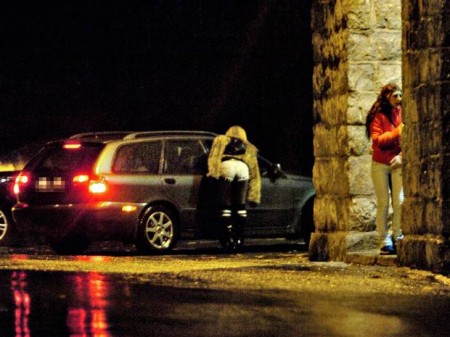Legislation currently being sold as protecting women by criminalizing their clients [yes, it’s as ridiculous and evil as it sounds] is making prostitutes feel less safe
Steps to tighten the laws on buying sex in Nordic countries are winning adherents around Europe, but feedback from the sex workers they were drawn up to protect suggests that the regulations may be making their work more dangerous.
The jury is still out on the efficacy of the new laws [no, it isn’t — these laws have failed everywhere — Ed.] which depending on the country involved were drawn up to safeguard women deemed to be in vulnerable positions, stop violence against women and strengthen human rights and gender equality [also false; the laws were put into place by coalitions of authoritarians: puritans and feminists – Ed.].
But interviews with charities, women’s rights activists and prostitutes themselves indicate that for many sex workers, the effect of the law has not been positive.
“The law is pushing prostitution more underground,” said Jaana Kauppinen, who heads a charity that helps sex workers in Helsinki and Tampere in Finland. “It makes the women more vulnerable and increases the risk of violence.” Sweden was the first to introduce a ban on buying sex in 1999, following a campaign started by women’s rights advocates who believed that buying someone’s body for sex was morally wrong. In the final proposal to criminalise the buying and not selling of sex, Stockholm focused on the vulnerability of the women and their right to “peace” and protection.
Finland followed in 2006 with a partial ban, making it illegal to buy sex from a person who was trafficked or pimped. Norway and Iceland adopted Sweden’s law in 2009.
Since then, France, England and Wales have all adopted Finland’s partial ban. A deal was struck by the ruling coalition parties in December to do the same in Germany. Ireland is considering a Swedish-style law. In February, the European Parliament voted in favour of Sweden’s law, on the basis that it considered prostitution constituted violence against women. The vote was not binding.
Some sex workers applaud the laws. “It is good the customers are scared,” said Tina, 24, from Romania, waiting for clients in the streets in central Oslo. “If they try to get more than what they paid for, or if they threaten to be violent, I can tell them: ‘I am going to call the police, tell them where we are and give them the registration number of the car’.”
But most sex workers interviewed in Finland, Norway and Sweden said the new laws made their working conditions more dangerous.
“Now women have to go to the customers’ homes, which is one of the most dangerous ways to work: you don’t know what you walk into,” said Pye Jakobsson, 45, a retired sex worker living in Stockholm.
Silvia, a 35-year-old from Bulgaria working as a prostitute on the streets of Norway, agreed the new secrecy posed problems. “Before we did not go far with the customer: we would go to a car park nearby. But now the customer wants to go somewhere isolated because they are afraid,” she said. “I don’t like it. There is more risk that something bad happens.”







[…] “The law is pushing prostitution more underground,” said Jaana Kauppinen, who heads a charity that helps sex workers in Helsinki and Tampere in Finland. “It makes the women more vulnerable and increases the risk of violence.” Sweden was the first to introduce a ban on …read more […]
These laws don’t just make them feel less safe, they make them materially less safe. And anyone who doesn’t see that as part of the agenda behind the whole pack of lying platitudes with which these laws have been sold doesn’t understand the politics behind them, which are not only anti-sex-work of all kinds, but also racist. I’m waiting for someone to connect the dots between the “progressive” policies of European governments that have enacted these laws and the very similar position of Europe’s anti-immigrant National Front parties. Could there be an uglier alliance than that between rabid rad-fems, conservative… Read more »